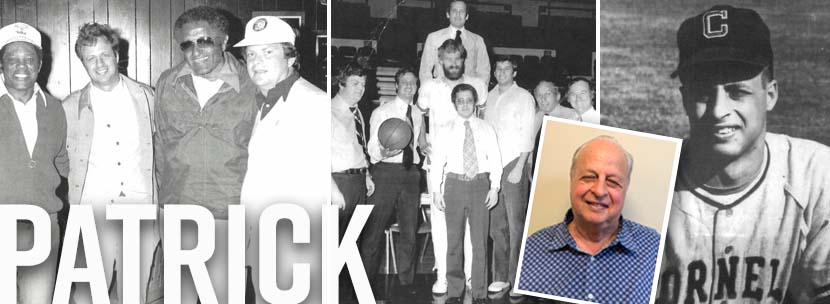 April 25th, 2025
April 25th, 2025

From polio to a Hall of Fame college athlete.
Patrick of American House Coconut Point never mentioned he knew famous people like New York Yankees legend Mickey Mantle, the “Say Hey Kid” Willie Mays and Phil Jackson, one of the greatest basketball coaches of all time. It took his friend, Life Enrichment Director Maribel Ortiz, to bring up some of the biggest names in sports history. But after meeting Patrick, it’s not surprising that the kid who grew up in a rough Italian neighborhood is not a name dropper.
“I grew up in Mamaroneck, a small town in Westchester County, New York,” Patrick said, “and the way I see it is we had nothing, but we had everything, you know? I have fond memories of my old neighborhood, even without the material things.”
His father was a truck driver and his mother worked in a factory. Neither made it past seventh grade. “When I was a kid, you had to go work for the family,” Patrick said. “In those days, everyone had to work. The family needed the income. My parents were wise, street-smart people.”
Patrick’s father’s family came over from Italy, while Patrick’s mother was from Connecticut. Patrick attended Mamaroneck High School, where he felt blessed to play three sports. But as with most things with Patrick, he had to work for his success.
“I was diagnosed with polio when I was nine years old. The doctors didn’t think I was going to make it. I was in the hospital for quite a while and there was no vaccine back then. I’ll never forget it when a doctor asked me to do a deep knee bend. I did it and he said, ‘I don’t believe it.’ I was lucky to be able to beat polio and come back and play sports.”
Most kids back then with polio weren’t so lucky. In an unusual twist, Patrick felt more coordinated than ever after he had polio. He became a natural athlete and was offered a full scholarship to Cornell University. A 165-pound shortstop, Patrick was captain of the 1962 baseball team, a two-time team MVP, hit .404 as a senior and compiled a three-year career batting average of .377. He also found time to play halfback on the football team, earning a letter in 1960. It’s no wonder he was inducted into Cornell’s Sports Hall of Fame. Not a bad college career from a kid from a tough town and no connections to the Ivy League.
“When I say I’m blessed, I don’t mean to sound corny,” Patrick said. “I mean it.”
After graduating from the prestigious university, he went on to play two seasons for the Montgomery Rubbles, a minor league affiliate of the Detroit Tigers. It was the early 1960s and
the United States Army came calling. Patrick went through basic training at Fort Bliss in El Paso, Texas. His first order said he was going to Vietnam. Patrick was packed and ready to ship out to Da Nang when his orders changed and he was sent to Germany instead. He spent three years in Germany and got out of the military in 1965 when he was 26 years old. Patrick believes he was lucky to go to Germany instead of Vietnam for those three years. “I say it all the time,” he said. “I’m a very fortunate man.”
After his stint in the military, Patrick went to work for Xerox for five years. He then got an opportunity to go into the broadcast business where some famous athletes got the chance to hang out with a Hall of Famer from Cornell University.
“I lived in Manhattan for 25 years. My office was in Times Square when it wasn’t a nice place like it is today,” he said, laughing. “I traveled extensively, living in airports and out of my suitcase. Sometimes I didn’t even know what city I was in.”
Patrick knew he needed a change at this point in his life. He moved down to Florida to get away from the noise and pollution of New York and he’s happy he did.
“When I first moved down here, I kept looking up at the sky and people asked me what I was doing. I just couldn’t believe how fresh the air was. I love it here. I’ve been in Florida for 18 years.”
For the last three years, Patrick has been at American House. “I get along with all the people here, especially Maribel. I love having everything in one building and the location is perfect. It’s a very lively and social community. I love American House. I’m one happy camper.”
We all have a story. A story that taught us something, changed us and helped define who we are. At American House, your next chapter is waiting to be written. We’re here to help you write it. Your way.
More to read
Let’s find your community
Maintaining a home and your health can become a challenge as you age. American House provides the care, amenities and services that make life easier. Find out how American House can help you live life to its fullest.



